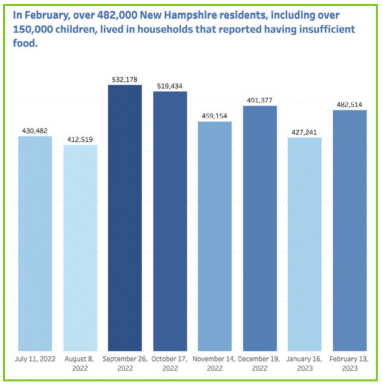Recent data from the U.S. Census Bureau Household Pulse Survey estimates a current 7.8 percent rate of food scarcity in New Hampshire — approximately 80,000 people.
The Northeast Organic Farming Association of New Hampshire says individuals and families across the state, regardless of income, should have access to fresh and local food. Its Farm Share Program is trying to make a dent in the fight.
Limited-income New Hampshire residents have through April 9 to apply for this year’s program, which offers community-supported agriculture shares, commonly known as CSAs, for discounted prices across the state. The various share options span from 11 weeks to year-round.
In the Farm Share Program, NOFA-NH contributes 50 percent of the cost of each farm share, while recipients contribute 25 percent and farms donate the rest.

A chart from NH Hunger Solutions shows the reported rates of hunger in New Hampshire over the last several months. (Screenshot) Since 2017, the program has partnered with 15 farms and provided 167 shares to more than 550 community members, benefitting primarily children, families and seniors.
The annual program comes as additional aid provided during Covid for the Supplemental Nutrition Assistance Program ended last month for the state’s nearly 72,600 food stamp recipients. The state Department of Health and Human Services has begun advising residents where to find food pantries and other assistance, while also encouraging more people to apply for SNAP in general.
Farms participating in this year’s discounted CSA program include Abenaki Springs Farm (Walpole), Brookford Farm (Canterbury), Local Harvest CSA (Merrimack and Hillsborough County), Mountain Heartbeet (Effingham), Open Woods Farm (Grafton), Pork Hill Farm (Ossipee), Stout Oak Farm (Brentwood), Tuckaway Farm (Lee), Winter Street Farm (Claremont), and Waxing Moon Gardens (Sandwich).
In 2022, shares were distributed across eight counties, and nearly 50 percent of those who benefitted were 17 and younger, or 65 and older, according to NOFA-NH.
— HADLEY BARNDOLLAR/NEW HAMPSHIRE BULLETIN